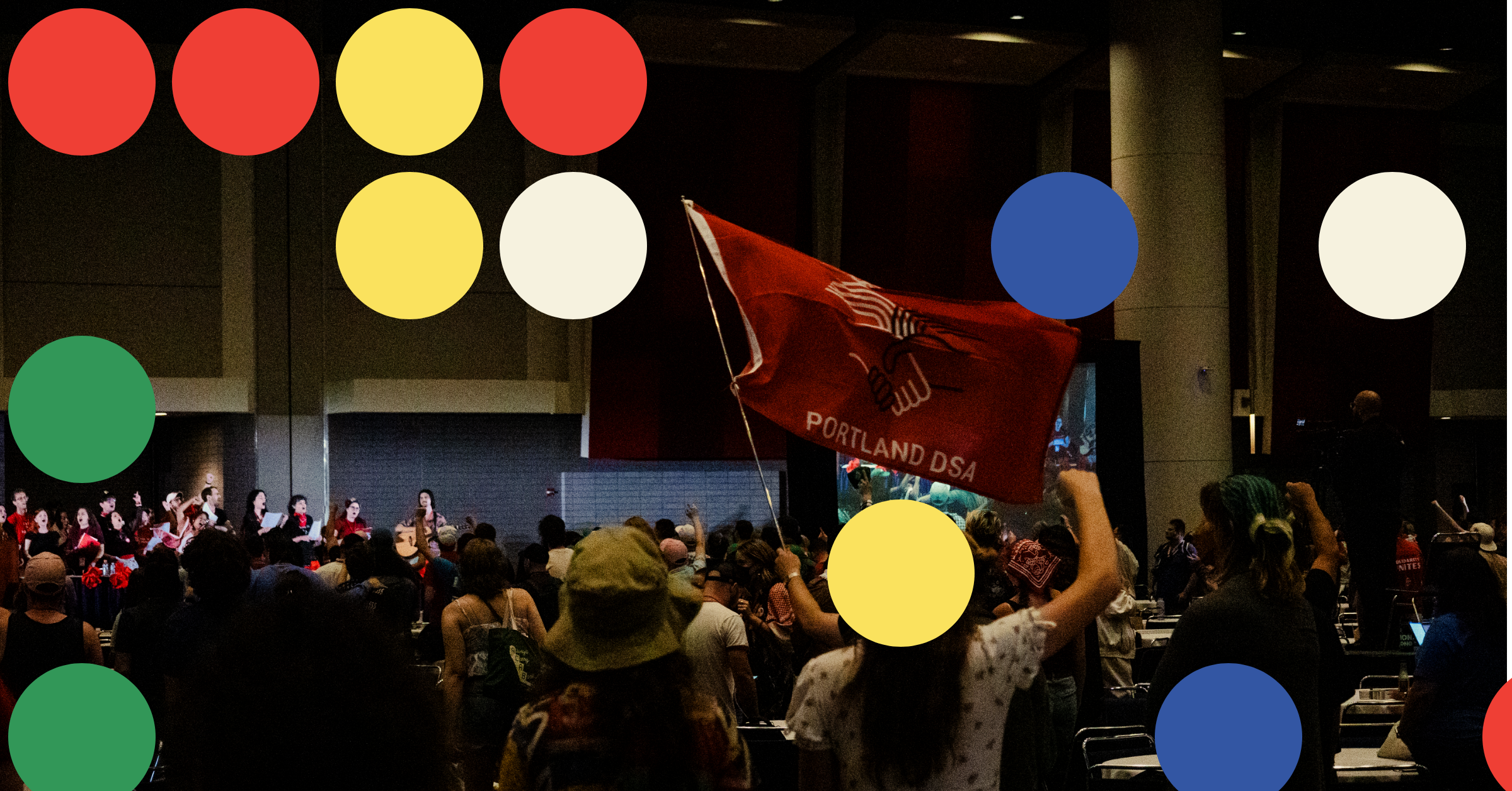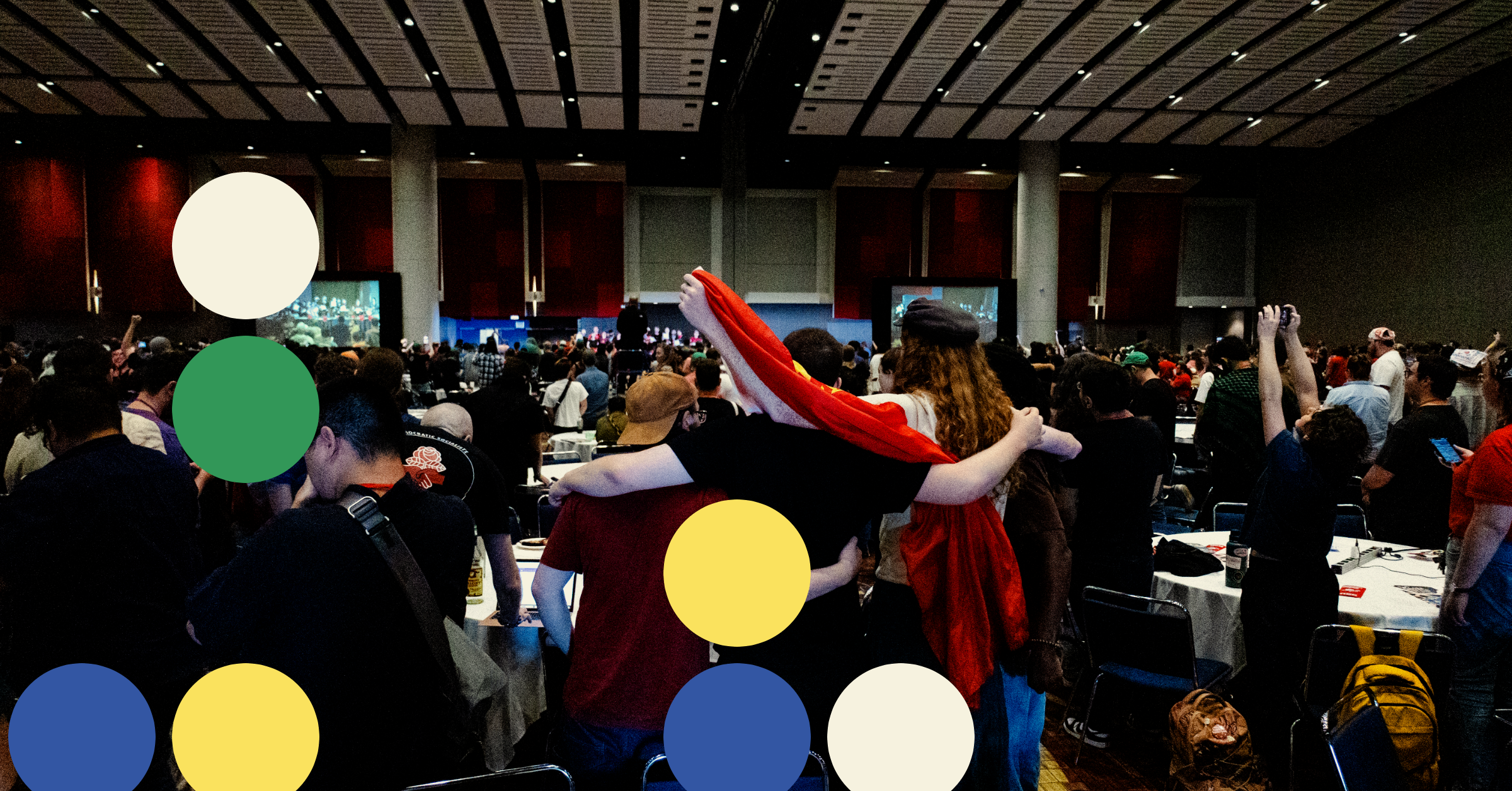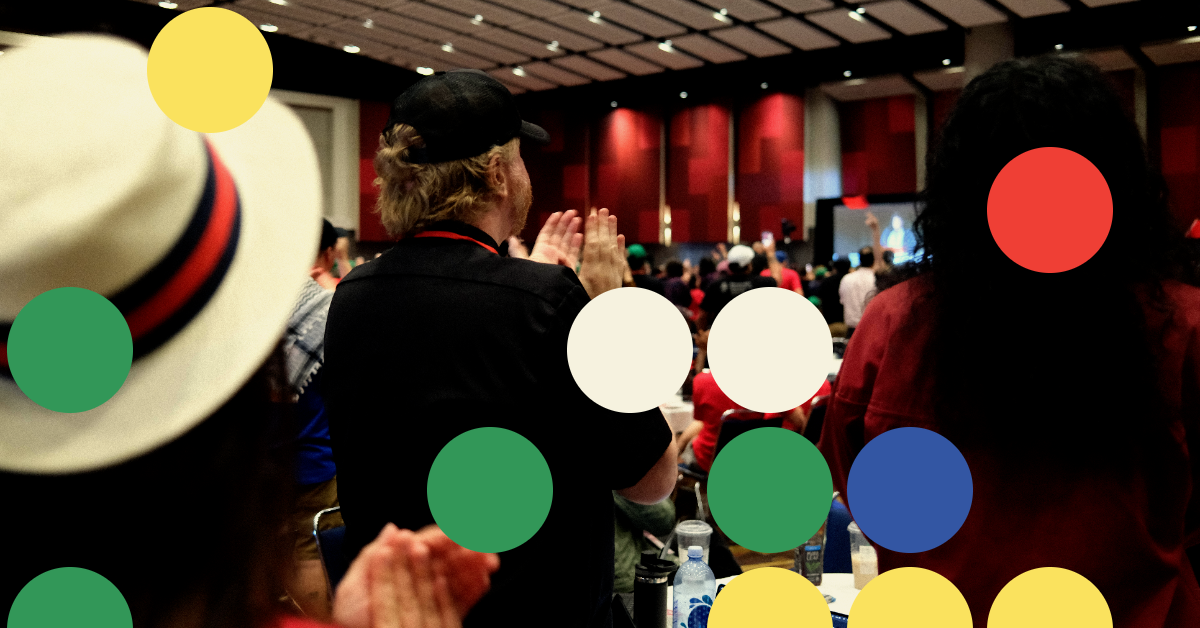Capitalism is a global system and must be overturned on a global scale. Internationalists around the world have long recognized that the central conflict in society is between classes, not competing nation-states, and that working classes around the world have a shared struggle against their collective oppressors. Capitalism’s global reach also subjugates the self-determination of peoples in the global periphery to the interests of capitalists in advanced capitalist countries like the United States. Any serious socialist project in the heart of empire must make internationalism central to its program, opposing U.S. imperialism while standing in solidarity with and learning from workers’ movements around the world.
Over the past few years, DSA’s international work has taken two steps forward. In 2017, a rejuvenated DSA threw off its historical support for Israel, declaring our support for BDS, and left the neoliberalized Socialist International. DSA has also mobilized in opposition to U.S. militarism against Iran, the criminal embargo on Cuba, and Israeli apartheid. And the DSA International Committee (IC) has built meaningful connections with left parties and movements around the world, organizing multiple successful delegations to various countries, showing our commitment to making DSA part of a truly international movement for socialism.
But DSA’s international work has also retreated, largely because of the inconsistent internationalism of DSA’s International Committee (IC), which fails to establish solidarity with workers’ movements challenging governments that are not allied with the United States. Following the IC’s approach, DSA loses out on lessons we could learn from comrades in these countries, demonstrates ourselves as unreliable allies in the international struggle for democracy and socialism, and risks severely limiting the potential domestic base for anti-imperialist politics by telling workers that to oppose U.S. imperialism is to support — or at the very least be silent about — authoritarianism and nationalism abroad. The 2023 DSA Convention has a chance to vote for Amendment C: For a Class-Struggle Internationalism, which offers an urgently needed course correction to this flawed approach.
Convention Delegates Can Reorient DSA to a Class-Struggle Internationalism
Because our strategy for anti-imperialism and internationalism has often been a flashpoint in DSA, sometimes very publicly, it’s clear that delegates at the 2023 Convention need to engage with and settle major questions about our approach. To facilitate clear debate, the Internationalism Committee wrote a consensus resolution to settle largely nonpolitical, operational questions, moving the much-needed debates about politics to member-submitted amendments.
Amendment C to the IC’s Consensus Resolution, For a Class-Struggle Internationalism, put forward by DSA’s Bread & Roses caucus, adds three important “resolved” clauses to the base resolution. Each will bring DSA’s approach more in line with our organization’s domestic commitment to pluralism, democracy, and class independence while proposing a positive political program for international solidarity and anti-imperialist organizing. Amendment C does the following:
- It establishes that DSA will take a “big-tent” approach to building international relationships, which means establishing relationships with various different tendencies of the international left. This deviates from the IC’s current practice of prioritizing leading or ruling left parties and also moves toward a sharper focus on democratic socialist activists embedded in labor and social movements.
- It sets clear principles for supporting workers’ movements for democracy and socialism everywhere, regardless of the political character of the government they’re fighting.
- It clarifies that we do not have to choose between national camps but can support workers everywhere struggling against the U.S. and other powers. Our support for workers’ movements in countries opposed to U.S. imperialism does not amount to supporting imperialist intervention, broad-based sanctions, or regime-change efforts that effectively undermine struggles for democratic socialism.
Amendment C offers a positive change to the inconsistent approach of the IC over the last few years. Specifically, the IC has muted our organization’s criticism of other governments’ authoritarian or anti-worker policies when the country in question opposes U.S. imperialism or identifies as left-wing. The IC has also shown uncritical support for moderate center-left governments in the Global South, blanket support we would not extend to similarly moderate parties like the neoliberal U.K. Labour Party. Last, the IC has not only avoided criticism of countries directly dominated by U.S. imperialism today but has also minimized or completely avoided criticism of the U.S.’s rising “great power” rivals, namely the Russian and Chinese states and ruling classes. These actions will continue if the 2023 Convention doesn’t vote for a new political direction for our international work.
How Should DSA Fight Imperialism?
The project of building mass support for anti-imperialism is made more difficult when DSA ties our opposition to U.S. imperialism with support for authoritarianism abroad. Amendment C is rooted in a different analysis of socialist internationalism than the one that the IC has followed, one which has often led the organization into controversy and confusion. Two such examples were our organization’s inadequate response to the Russian invasion of Ukraine and the IC delegation to Venezuela that took a position of uncritical support for the Maduro government and declined to meet with anti-Maduro socialist working-class forces. Both of these events unnecessarily provided ammo to the capitalist media in painting our organization as supporting Russian militarism and Venezuelan authoritarianism.
We all agree that one of the most important contributions U.S. socialists can make to international class struggle is fighting U.S. imperialism at home and abroad. This includes ultimately taking state power with the support of a working-class majority and dismantling U.S. empire. We disagree, however, on how to do that.
The dominant tendency on the DSA IC holds a perspective that fighting U.S. imperialism requires us to be quiet when governments not allied with the United States (like governments in Nicaragua or China) carry out anti-worker and anti-democratic policies. At best, DSA’s proponents of this form of realpolitik acknowledge there are real problems within these countries but still believe it is counterproductive for U.S. socialists to criticize them, arguing it takes our fire off of the U.S.’s imperialism and plays into the narratives about the U.S.’s “enemies” that are used to drive further imperialist violence and militarism. In the most extreme form of this position, some comrades offer full-throated support to these governments, wholly denying their pursuit of authoritarian and anti-worker policies.
In practice in DSA’s IC, this tendency has led to missed opportunities for international solidarity, like a failure to connect with antiwar socialist organizers in Russia who are fighting both the invasion of Ukraine and the undemocratic Russian State, as well as rejecting support for Belarussian trade unions under attack as they fight their government’s participation in the invasion. Similarly, when the Chinese government suppressed independent trade unions in Hong Kong, the DSA IC voted against signing onto a statement of solidarity with Hong Kong’s workers, effectively siding against independent working-class organization and action. And the IC even recently — with the support from the majority of the NPC except members of Bread & Roses, who voted against — removed DSA’s 2019 statement on Nicaragua from the DSA website (here it is on the site’s archive). The original statement opposed U.S. intervention and supported Nicaragua’s working-class and popular movements fighting the authoritarian, anti-worker Ortega government. As an alternative to the 2019 statement, the NPC majority kept a 2021 IC statement that omits references of support for worker movements opposing Ortega. While many of these governments and parties should be conditionally supported in their struggles for self-determination against U.S. empire, we cannot abandon the basic democratic socialist principles of working-class independence and democracy in the process.
This approach affects all organizers in DSA, whether we engage in explicit internationalist organizing or not. When talking to workers about democratic socialism we need to be able to confidently say that the world socialists envision and fight for is not the repressive, authoritarian society of China or Venezuela, as the media would have them believe, but one of expansive democracy and freedom.
Throughout the United States, we seek to organize within and alongside working-class immigrant diasporas, many from authoritarian countries, some of which have nominally socialist governments, like Chinese or Venezuelan immigrants, or those from the former USSR. Many immigrants from these countries are right wing and won’t be won over by our movement. But many more are workers struggling to make ends meet, for whom joining a mass socialist movement will advance their own interests and liberation. It is essential that we can tell these workers that we stand in solidarity with them and their families and fellow workers against violence and oppression, whether it’s here in the U.S. or back home. This includes opposing U.S. sanctions and warfare that wreak havoc on their home countries and supporting popular movements in those countries fighting for democracy and socialism against their ruling classes. Failing to do the latter undermines our ability to build support for the former.
Democratic Socialism is Working-Class Self Emancipation
In our approaches to labor organizing and electoral politics, DSA should, and often does, follow the fundamental Marxist principle that the “emancipation of the working classes must be conquered by the working classes themselves.” This means that only the international working class, through its own struggles, can win democratic socialism worldwide. Socialists’ role around the world is to foment this struggle by building mass democratic working-class movements and institutions that can chart out their own path through collective deliberation and decision-making, not by uncritically following politicians, union leadership, NGOs, or party officers.
DSA does this with our labor work when we follow the rank-and-file strategy, which holds that only workers (not staffers or bureaucratic officials) can lead the work to democratize their unions and forge them into weapons of class struggle. Similarly, when DSA follows the principle of independent political action, it’s because we recognize that capitalist parties cannot serve as the vehicle for a serious working-class program and an alternative democratic socialist vision for society. Instead, workers need to build a party of their own to fight for their own interests in the state. Neither of these perspectives deny the important role of leadership, but recognize that leaders must be democratically accountable and work in service of building independent democratic working-class power.
Liberals and some on the more moderate wing of DSA say that criticizing establishment union leaders is doing the work of capital, or that criticizing the Democratic Party only helps the right. Similarly, the dominant politics on the IC stem from a faulty belief that any open criticism of governments opposed to the U.S. is effectively doing the work of U.S. empire.
However those critiques of the rank-and-file strategy and independent political action ring hollow. Independence from and criticism of the establishment union leadership and the Democratic Party’s capitalist leadership is essential to building a democratic working-class movement that can meaningfully fight the boss, defeat the right, and ultimately take state power and initiate a transition to socialism. And even within unions with reform leadership, or among our own socialists in office, their strength to fight the boss and challenge capital is rooted in the level of democratic self-organization of the members and power on the shop floor and in broader society. When this same line of critique is leveled at a class-struggle international approach, it rings just as hollow.
An undervalued, but centrally important, feature of our international work is the opportunity to learn from comrades around the world engaged in the same types of struggles. Workers’ movements around the world have a wealth of experience and lessons for us to draw on, with many more decades of socialist struggle under their belt. Why would we adopt a perspective of working-class self-emancipation at home while deprioritizing learning from comrades doing the same elsewhere? Especially as a young movement, we have to look internationally for lessons from the successes and failures of movements abroad. A class-struggle international perspective ensures we take the right lessons.
We’re Missing Out on a World of Workers’ Struggles
Amendment C offers an alternate vision to the political dead end that guides DSA’s IC. The resolution starts instead from the principle of self-emancipation and identifying mass democratic workers’ movements — not antidemocratic or class collaborationist parties or leaders — as the key to international liberation.
We should continue the relationships the IC has already established with leading parties like Brazil’s Workers Party (PT) and Venezuela’s United Socialist Party (PSUV). But we need to go beyond these parties. Amendment C would guide DSA toward exciting, important work that will likely not happen without its passage, like connecting with and learning from groups like the following:
- the Party for Socialism and Liberation (PSOL), Brazil’s democratic socialist party that supports Lula against the right while also fighting his austerity measures;
- independent anti-imperialist working-class forces in Venezuela challenging Maduro’s authoritarianism and regression toward neoliberalism;
- democratic socialists in Ukraine fighting both the Russian invasion and their own government’s anti-democratic and anti-labor policies;
- anti-war movements in Russia and Belarus fighting their governments’ illegal invasion of Ukraine; and
- independent trade unions in Hong Kong and Marxist youth labor organizers in China facing state repression.
None of this critical international work will be possible under the IC’s current approach. For example, the current IC met briefly with PSOL, but those relationships have been deprioritized in favor of closer ties to PT. All this despite the fact that PSOL, similar to DSA, is figuring out how to thread the needle in fighting the far-right while also presenting an alternative to the center-left. We have so much to learn from these parties and movements and so much to gain by supporting them.
The political orientation that guides DSA’s international work undermines our commitments to class struggle, democracy, and socialism and limits our ability to build a mass anti-imperialist movement. Convention delegates should vote “Yes” on Amendment C to the IC Consensus Resolution, For a Class-Struggle Internationalism. A class-struggle internationalism orientation will ground and strengthen DSA’s international work in the years to come, giving us the analyses and tools necessary to build an international working-class movement capable of dismantling imperialism and ultimately win democracy and socialism worldwide.




